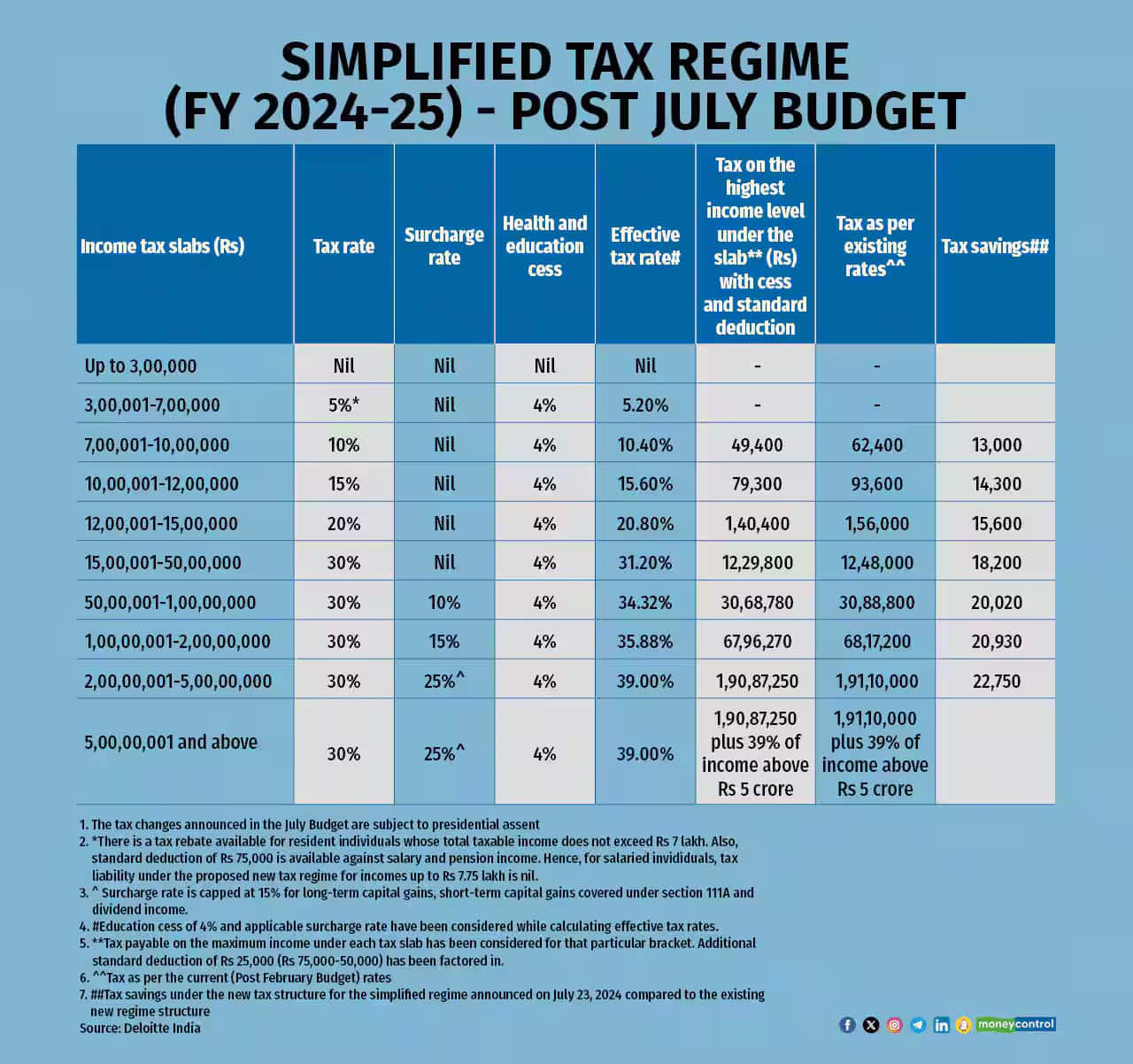



Filing income tax returns is likely to be complex this year, thanks to a raft of changes in the capital gains structure and the new regime's income tax slabs.
Budget 2024 had decided to rejig the new regime's income tax slabs and capital gains tax structure. All these changes will have to be factored in now while filing tax returns for FY2024-25.
Here are the top five tax changes one needs to bear in mind while filing ITR this year:
How tax slabs and rates under the new, simplified regime stack upBudget 2024 liberalised I-T slabs under the new, minimal-exemptions regime further, incentivising a shift away from the old, with-exemptions tax regime.
These are the I-T slabs and effective tax rates for 2024-25 under the new tax regime:

Since the revisions in tax slabs and rates, only those claiming substantial tax benefits - such as the Rs 2 lakh home loan interest deduction under Section 24(b) or a sizeable house rent allowance (HRA) - may find the old regime more advantageous. In fact, only HRA could be the needle mover in most cases, as all other deductions put together may not yield worthwhile reasons to stay with the old regime.

Rejig of capital gains tax structure on July 23, 2024 attracted more attention than the changes in new regime slab rates. From financial year (FY) 2024-25, all financial and non-financial assets attract a long-term capital gains (LTCG) tax at 12.5 per cent (up from 10 per cent in the case of equities), while short-term capital gains (STCG) tax on some assets, for instance equities, would be 20 per cent, up from 15 percent.
Moreover, the exemption limit for computing LTCG tax on stocks and equity mutual funds was increased from Rs 1 lakh to Rs 1.25 lakh. The Budget also announced that listed financial assets held for more than a year would be classified as long-term assets.
The LTCG tax rate on the sale of real estate assets was reduced to 12.5 per cent from 20 per cent, but the indexation benefit for properties purchased after April 1, 2001 was also withdrawn.
For many property-owners who had not seen significant appreciation in prices, this would have resulted in higher tax outgo. After the uproar over the withdrawal of indexation benefits to properties acquired before Budget 2024, the government came up with a solution to soften the tax blow for such individuals.
“The logic of the budgetary proposal on capital gains is that the structure has to be simplified…and to treat all asset classes equally. [Now, after the amendment to the finance bill] tax on the sale of assets purchased before July 23, 2024, can be computed under the old scheme with indexation or the new scheme… and (property sellers can) pay lower tax,” Sitharaman had said on August 7, explaining the rationale behind the original decision as well as the ‘rollback’.
Higher standard deduction under the new regimeThe standard deduction under the new regime has gone up from Rs 50,000 to Rs 75,000 for FY 2024-25, while it remains unchanged at Rs 50,000 under the old regime.
Hike in tax concession on employers’ NPS contributionFrom FY 2024-25, even private sector employees who opt for the new tax regime and sign up for corporate national pension scheme (NPS) stand to gain more. Employers’ contribution to employees’ basic salaries of up to 14 percent will be eligible for deduction, up from 10 per cent earlier.
Central and state government employees are already eligible for the 14 percent deduction under both the regimes. Under the old tax regime, this limit will be unchanged at 10 percent for private sector employees. For non-government employees, NPS is a voluntary scheme; they can contribute on their own through the all-citizens’-model as also under the corporate NPS scheme with some help from their employers.
Also Read: Opting for the new tax regime? Here’s how you can increase your tax savings
Have foreign income? Make disclosures, but no penalty for low-value assetsIndian employees working with multinational companies and deputed abroad for assignments get employee stock ownership plans (ESOPs) from such companies and often have to open bank accounts and enroll into social security schemes abroad.
Until 2023-24, inaccurate disclosure or failure to report such foreign assets in I-T returns would attract penalty of up to Rs 10 lakh under the Black Money (Undisclosed Foreign Income and Assets) and Imposition of Tax Act, 2015. From FY2024-25, however, not reporting low-value financial assets (worth up to Rs 20 lakh) will not invite any penalty.
Discover the latest Business News, Sensex, and Nifty updates. Obtain Personal Finance insights, tax queries, and expert opinions on Moneycontrol or download the Moneycontrol App to stay updated!
Find the best of Al News in one place, specially curated for you every weekend.
Stay on top of the latest tech trends and biggest startup news.